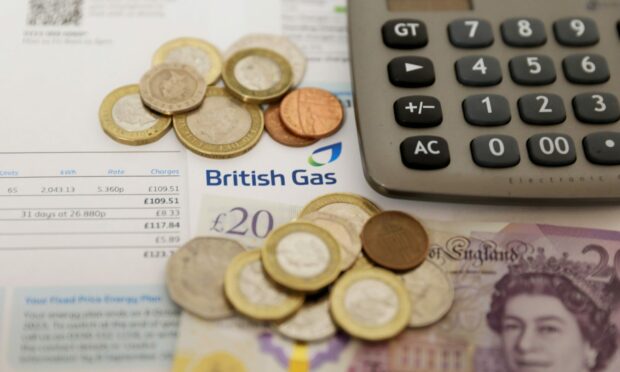Soaring energy prices are to push people on low incomes into “debt and destitution” this winter according to an Aberdeen debt charity.
Christians Against Poverty (Cap) is warning those already in financial crisis are to be hit even harder after the energy regulator Ofgem confirmed the cap on energy bills soared 80% to £3,549 per year.
The new cost cap which is intended to largely protect customers from the soaring cost of gas caused by a global shortage means energy prices for households will be three times higher than a year ago.
The new cap price will cause bills to rocket from October 1 and last until the end of the year, then rise to £4,650 from January.
‘Debt and destitution’
Cap Aberdeen debt centre manager Ben Clift said: “Those living on a low income are already in a financial crisis due to widespread rising costs.
“The October energy price rise, combined with all the other price increases, will result in debt and destitution for many local people this winter.
“It’s actually frightening to imagine what that figure will be this winter after energy prices have gone through the roof.
“Behind these stats are real people facing a real struggle to keep themselves warm and fed during the colder months.”
More financial help needed
Watchdog Which? has warned the government must raise its energy bills discount by at least 150% or risk pushing millions of households into financial distress.
It said the government’s financial support for all households must increase from the current £400 to £1,000 – or from £67 to £167 per month from October to March – following soaring energy price cap predictions.
The existing support package is inadequate to protect living standards for those on the lowest incomes and would lead to considerable financial and social hardship, it said.
When the government first announced its financial support package in May, the energy price cap was predicted to reach around £2,800 in October.
Analysts Cornwall Insight now predict that average energy bills will increase to £3,554 in October and hit £4,650 in January.
Meanwhile, another energy consultancy Auxilion has said energy prices could spike at as much as £6,823 per year for the average household from next April.
In comparison, the average bill in October 2021 was £1,400 a year.
But Which? warned that even a 150% increase in help would be insufficient for families on the lowest incomes, and said the government must also provide them with an additional one-off minimum payment of £150 to ensure the most vulnerable have the support they need.
More than £1.2 million of additional funding is being given to key organisations providing advice to households coming under increasing pressure from rising energy bills.
What will UK government do?
The UK government has come under pressure as the process to select a new Prime Minister grinds slowly to its conclusion on 5 September.
Neither candidate Lizz Truss nor Rishi Sunak have clarified how it might act to support either households or businesses.
However, a statement issued by the Department for Business, Energy and Industrial Strategy (Beis) said it was working to ensure “additional support or commitments on cost of living” would be ready to go “as quickly as possible” when the new PM was in place.
The statement said: “We know people are incredibly worried about rising energy bills, following unprecedented gas prices across the continent driven by global events, including Putin’s aggression in Ukraine and his weaponisation of energy in Europe.
“Direct support will continue to reach people’s pockets in the weeks and months ahead, targeted at those who need it most like low-incomes households, pensioners and those with disabilities. As part of our £37 billion package of help for households, one in four of all UK households will see £1,200 extra support, provided in instalments across the year, and everyone will receive a £400 discount on their energy bills over winter.
“The civil service is also making the appropriate preparations in order to ensure that any additional support or commitments on cost of living can be delivered as quickly as possible when the new Prime Minister is in place.”
Scottish Government support
The Scottish Government is providing the extra money to energy advice organisations to ensure consumers can access support.
The cash is going to Advice Direct Scotland, Home Energy Scotland and Citizen’s Advice Scotland.
The money also includes £300,000 to Business Energy Scotland to enhance the support available to businesses.
Advice Direct Scotland warned of an “incredibly challenging” period ahead.
The charity encouraged people not to struggle alone and highlighted a range of services and support that is available.
Advice Direct Scotland also stressed the importance of people ensuring they are claiming all benefits they are entitled to.
Its free online calculator, available at advice.scot, is tailored for Scotland and allows people to check their entitlement to both reserved and devolved benefits.
Winter financial distress
Which? director of policy and advocacy Rocio Concha said: “With energy bill predictions continuing to spiral, the government must increase the Energy Bills Support Scheme by at least 150%, or risk pushing millions of households into financial distress this winter.
“While increased support will provide relief for many, it is not a long-term solution. The government and regulator must urgently undertake a wide-ranging review of retail energy pricing – including the price cap – to build a fair and affordable system for consumers.
“The government must also develop a programme to urgently improve the insulation of homes – as this will help to reduce people’s energy costs for years to come.”
Living without heating
Cap, based in Catalyst Vineyard Church, says almost half of the people who approach them for help have been going without heating on a regular basis before making contact.
Mr Clift said: “People on a low income are finding the cost of living crisis is reducing their options and forcing them to make difficult decisions – like whether to use fuel to cook something or keep warm.”
“People need more support to ensure they have a livable income and can afford everyday essentials.”
“It’s more important now than ever that people know there is help and support out there.”


Conversation